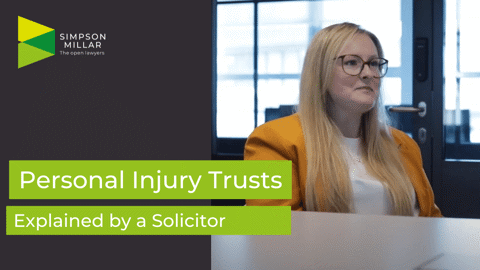
Adam Hogg
Senior Associate Solicitor and Department Manager, Court of Protection
If you or a loved one has received compensation for a personal injury, protecting those funds is essential for ensuring your long-term financial well-being.
When you settle a Personal Injury or Medical Negligence claim, you receive financial compensation to help you recover. However, if you are already claiming means-tested benefits such as Income Support, Jobseekers Allowance or Housing Benefit, or if your injury means you may need to claim benefits in the future, your compensation settlement could affect your eligibility.
By setting up a Personal Injury Trust, your settlement is safeguarded from means testing for state benefits. This allows you to retain the full amount of your compensation whilst remaining eligible for your benefits.
At Simpson Millar, we specialise in creating Personal Injury Trusts to protect your claim settlement. Our experienced Personal Injury Trust Lawyers are here to guide you through the process, understanding the importance of acting swiftly to ensure your trust is set up before your settlement is finalised.
Your Personal Injury Solicitor will also explain why it's crucial to protect your compensation following a successful personal injury or medical negligence claim, ensuring you're fully informed before your settlement is reached.
Fill in the form below to get in touch with one of our dedicated team members, or call our team today on: 0800 260 5010

A Personal Injury Trust (PI Trust) is a legal arrangement that ring-fences compensation, keeping it separate from your other personal finances. This means the funds are not counted as part of your savings or assets when you’re being assessed for benefits like Universal Credit, Income Support, or Housing Benefit.
By setting up a PI Trust fund, you can ensure your compensation is used for its intended purpose - helping you recover and supporting your future needs - without jeopardising access to essential benefits. This can be especially important if you need ongoing care, support, or financial assistance from the government.
The trust is managed by two to four trustees, one of which must be you, following specific rules outlined in a trust deed. There are different types of trusts available to suit various needs.
A Personal Injury Trust can help protect any current or future means-tested benefits after you get a compensation payment because of a Personal Injury or Medical Negligence compensation claim.
You would typically need a Personal Injury Trust if:
Some of the means tested benefits include:
To qualify for means tested benefits, your income and savings must be below a certain threshold, which is determined by the government. Each benefit has its own specific eligibility criteria, and your income and capital must meet these requirements to make a claim.
Without a Personal Injury Trust in place, if your savings exceed the threshold, your entitlement to means tested benefits may be reduced or withdrawn entirely. By placing the funds into a PI Trust, you can retain access to both your compensation and your benefits.
There are several key reasons to set up a Personal Injury Trust:
Under the 'one-year disregard' rule, compensation payments are excluded from means-testing for the first 52 weeks. This gives you a one year to set up a Personal Injury Trust and ensure that the compensation you receive won’t affect your eligibility for benefits in the future.
If you’re unsure whether a Personal Injury Trust would benefit you, our trusted team is here to discuss your circumstances and offer clarity so you can make informed decisions about your finances.
Setting up and managing a Personal Injury Trust involves a few key steps, from choosing your trustees to deciding how the money will be used.
To set up a PI Trust, you’ll need to:
It’s important to seek legal advice during this process to ensure the process is followed correctly and your trust is tailored to your specific needs.
If you have received compensation from a personal injury claim and want to protect your benefits eligibility, we are here to help you.
You can choose who becomes a Trustee. Usually it involves you (the beneficiary), and between one and three others. These can include spouses or partners, relatives, close friends, or professionals such as Court of Protection Solicitors. Trustees must be 18 or over and not have any personal finance issues.
It’s vital you choose people that are responsible, who understand the legal role and duties involved, and who will act in your best interests. A Trustee should be someone you trust and whose judgement you respect.
The role of a Trustees comes with responsibilities and duties. Trustees are responsible for managing the PI Trust fund according to the trust’s terms, agreed at the outset. This includes making decisions about how and when to release funds. Trustees have a legal duty to act in your best interests and ensure that the trust is properly managed for your long-term benefit.
Trustees do receive guidance on what's expected from them, helping them make informed decisions about managing the trust and making payments. This is especially helpful when managing a large sum of money, making sure it’s used wisely and the beneficiary gets the maximum long-term value from it.
Once your compensation is deposited into the trust fund, you can access the funds in your Personal Injury Trust at any time, as long as the request falls within the agreed terms of the trust.
Any withdrawals will require your Trustees’ approval, to ensure that the funds are managed properly and used for your benefit.
The money in a Personal Injury Trust can be used for anything that benefits the beneficiary, such as:
Trustees have discretion over how the money is spent, but they will ensure it aligns with the purpose of the trust and the best interests of the beneficiary.
While it’s not legally required to have a solicitor set up your Personal Injury Trust, it’s highly advisable. Trusts are complex legal documents, and mistakes in setting them up can have serious consequences for your compensation and benefits. Working with our experienced court of protection health and welfare solicitors, avoids errors and smooths out any uncertainties so you can be sure your PI Trust has been set up correctly first time.
Our experienced team of PI Trust specialists can guide you through the process of setting up a fund, helping to remove uncertainty and ensure your compensation is protected as swiftly as possible.
A solicitor can ensure that your PI Trust is:
At Simpson Millar, our dedicated team specialises in Personal Injury Trusts, helping clients protect their compensation and safeguard their future. We’ve supported many individuals in setting up trusts that ensure their financial security, whilst also maintaining their eligibility for means-tested benefits.
We understand the importance of clear, expert legal advice when you're ready to take this step. From the start we’ll provide straightforward guidance on your options, so you know exactly what to expect moving forward.

Specialist Trust Solicitor Kayleigh Smith talks through what a personal injury trust is, how to set one up and why you should look at this.
It will cost £1,000 + VAT, depending on how complex the Trust is and whether you need a home visit. Your Solicitor will take time to fully understand your needs to calculate how much it will cost to set up your Trust. We offer a Fixed Fee Price which means we will never charge you more than the agreed amount.
In some cases, your Personal Injury Solicitor can ask the defendant to include these costs in your Personal Injury settlement, along with any associated running costs. These costs will then be paid for by them for the life of the Trust.
The money in the trust is managed by your trustees, including you, and can only be used for your benefit according to the trust’s terms. It is legally protected from affecting your eligibility for benefits.
A Special Needs Personal Injury Trust is designed specifically for individuals with long-term disabilities or care needs. Like a Personal Injury Trust, these trusts ensure that compensation is preserved to cover future care costs without affecting your access to current or future benefits.
Generally, a Personal Injury Trust fund is not subject to Income Tax, Capital Gains Tax, or Inheritance Tax, though some exceptions apply. We can advise you on any specific tax implications of your trust.
Yes, you can change your trustees if necessary. This is usually done through a formal deed of change, and our Solicitors can help you with this process.
A Personal Injury Trust can usually be ended once all the funds have been used or if the trustees and beneficiary agree to close it. However, it’s important to consider the long-term impact on your benefits before making this decision.
If you’ve received a compensation payment and need to protect your state benefit eligibility now and for the future, our team is here to help you set up a Personal Injury Trust that meets your needs. To find out more, or to begin setting up your PI Trust, contact our team today.
Fill in the form below to get in touch with one of our dedicated team members, or call our team today on: 0800 260 5010